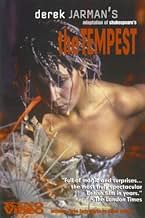VALUTAZIONE IMDb
6,3/10
1339
LA TUA VALUTAZIONE
Aggiungi una trama nella tua linguaBanished to a forsaken island, the Right Duke of Milan and Sorcerer Prospero gets the chance to take his revenge on the King of Naples with the assistance of his airy spirit-servant, Ariel.Banished to a forsaken island, the Right Duke of Milan and Sorcerer Prospero gets the chance to take his revenge on the King of Naples with the assistance of his airy spirit-servant, Ariel.Banished to a forsaken island, the Right Duke of Milan and Sorcerer Prospero gets the chance to take his revenge on the King of Naples with the assistance of his airy spirit-servant, Ariel.
- Regia
- Sceneggiatura
- Star
Recensioni in evidenza
I'm amazed that of all the reviews I've looked at nobody seems to have noticed one of the main points of this film, or at least how I saw it. It seems like one big homosexual fantasy, camp clothing, a glorified nude Ferdinand, a definite sexual tension between Ariel and Prospero, and as a final climax, a group of men in tight sailor suits dancing the hornpipe. This whole approach, once you get used to it, provides you with all sorts of fantastic scenes and images. The sight of an innocent Ariel being pulled towards a disgusting nude Sycorax in order to perform "her earthy and abhorr'd commands", is one of the darkest I've ever scene in a Shakespeare film. However by the end of the film I'd grown tired of the style and the final hornpipe dance was just too much to take. Still overall its an interesting interpretation of the play.
Derek Jarman's take on Shakespeare makes it into something of a punk symphony, without sacrificing the heart of the play. His cast are mostly very good especially Heathcote Williams as Prospero, Toyah as Miranda, and Karl Johnson as Ariel and the bits that are added fit in well, especially Elisabeth Welch's appearance singing Stormy Weather'.
Comedy light relief is provided by Ken Campbell and Christopher Biggins as the shipwrecked drunks finding themselves on Prospero's enchanted island, with Jack Birkett as a creepy Caliban.
The film keeps the interest by using the unexpected it may miss the point of the quieter moments of the play but makes up for this by its sheer inventiveness. Even the songs are treated well with Johnson's sharp suited sprite showing a mischievous streak which works perfectly. All this is covered with a queer gloss which informs the play with a new perspective.
Comedy light relief is provided by Ken Campbell and Christopher Biggins as the shipwrecked drunks finding themselves on Prospero's enchanted island, with Jack Birkett as a creepy Caliban.
The film keeps the interest by using the unexpected it may miss the point of the quieter moments of the play but makes up for this by its sheer inventiveness. Even the songs are treated well with Johnson's sharp suited sprite showing a mischievous streak which works perfectly. All this is covered with a queer gloss which informs the play with a new perspective.
Derek Jarman has shown us time and time again that dialog is not his strong suit. He is a painter, and paint he does. His films are almost always visually splendid, but about as exciting to watch as paint that is already dry. Watch his movies in fast forward, the really fast setting that you can only get on DVD. In The Tempest, Jarman does very little with the script or the characters, using them as simply a lattice to hang a very long and well-constructed cinematographic frame. He even goes so far as to contradict Shakespeare's original script to achieve these excrucriatingly slow and lifeless scenes. There is none of the romance, magic, trickery, or urgency the script calls for, little spontaneity, and the character of Caliban in particular is reduced to a quivering and insane idiot of sorts, similar to Gaveston in Jarman's Edward II. It is too bad that this is just about the only film version of The Tempest available.
Into this primordial mix, add some seventeenth century magic, and you have Shakespeare's "The Tempest", a play whose themes are: freedom, temperance, repentance, and forgiveness. The main difference between Shakespeare's play and Derek Jarman's film is, of course, the nearly four hundred years of change in theatrics that separate the two artists.
Jarman's version tries to adhere to the play, in that the film uses quasi-Elizabethan linguistics, which renders the dialogue difficult to understand. The play's intent is still intact in the film, if a little obscured by the language, and is conveyed mostly through the acting and the cinematography, though "adapted" in style to a more contemporary audience. Hence, the film's inventive finale features a vocal rendition of "Stormy Weather", a modern metaphor for a message that spans the ages.
Even with the updated visuals, this film is going to be a bit much for most viewers. It is just too out of sync with what modern audiences expect. On the other hand, for those few who appreciate Shakespeare, the film can be insightful, with the proviso that it is not "pure" (or literal) Shakespeare.
Jarman's version tries to adhere to the play, in that the film uses quasi-Elizabethan linguistics, which renders the dialogue difficult to understand. The play's intent is still intact in the film, if a little obscured by the language, and is conveyed mostly through the acting and the cinematography, though "adapted" in style to a more contemporary audience. Hence, the film's inventive finale features a vocal rendition of "Stormy Weather", a modern metaphor for a message that spans the ages.
Even with the updated visuals, this film is going to be a bit much for most viewers. It is just too out of sync with what modern audiences expect. On the other hand, for those few who appreciate Shakespeare, the film can be insightful, with the proviso that it is not "pure" (or literal) Shakespeare.
The Tempest has been interpreted in many different ways ranging from more or less traditional views as dealing with Art to more post-modern approaches that like to dissect the play along post-colonial, feminist, gender or deconstructionist lines. The reason why Jarman's version left me fairly cold is that I didn't have a clue what he was on about. What is the underlying vision/idea/concept behind this rendering of Shakespeare? The previous reviewers do not get much further than revenge tragedy, punk show, but surely there is more to it, isn't there? This is not to say that there is no vision here, just that I was hard put to discover it. Be that as it may, there are still things to enjoy. The punk flavour is refreshing and funny. Toyah Wilcox as Miranda and Jack Birkett as Caliban are wonderful. I did not much care about Williams as Prospero ... not enough magic I suppose. The switches between the old monastery/castle and the (very English) world outside can be a little unsettling at times, but I guess that is intentional. All in all, interesting but not quite the success I had hoped it might be (particularly after seeing Jarman's Caravaggio).
Lo sapevi?
- QuizThe role of Prospero was originally intended for an older actor and John Gielgud was approached but declined. It was then offered to Terry-Thomas but his failing health caused him to turn it down. The character was then rewritten as a younger Prospero and Heathcote Williams was cast.
- Citazioni
Miranda, his daughter: Oh, how beauteous mankind is. O brave new world that has such people in it!
- Curiosità sui creditiMany Thanks To All Those Who Took An Interest and Especially... and All The Sailors Who Weathered The Storm.
- ConnessioniFeatured in Toyah (1980)
- Colonne sonoreStormy Weather
Written by Harold Arlen & Ted Koehler
Performed by Stephen Pruslin (as Steven Pruslin) and Dave Campbell
Sung by Elisabeth Welch
Arranged by Stephen Pruslin (as Steven Pruslin)
Produced by Guy Ford
I più visti
Accedi per valutare e creare un elenco di titoli salvati per ottenere consigli personalizzati
- How long is The Tempest?Powered by Alexa
Dettagli
- Data di uscita
- Paese di origine
- Sito ufficiale
- Lingua
- Celebre anche come
- Der Sturm - The Tempest
- Luoghi delle riprese
- Azienda produttrice
- Vedi altri crediti dell’azienda su IMDbPro
Botteghino
- Budget
- 150.000 £ (previsto)
- Lordo in tutto il mondo
- 813 USD
- Tempo di esecuzione1 ora 35 minuti
- Mix di suoni
- Proporzioni
- 1.37 : 1
Contribuisci a questa pagina
Suggerisci una modifica o aggiungi i contenuti mancanti

Divario superiore
By what name was The Tempest (1979) officially released in Canada in English?
Rispondi

























